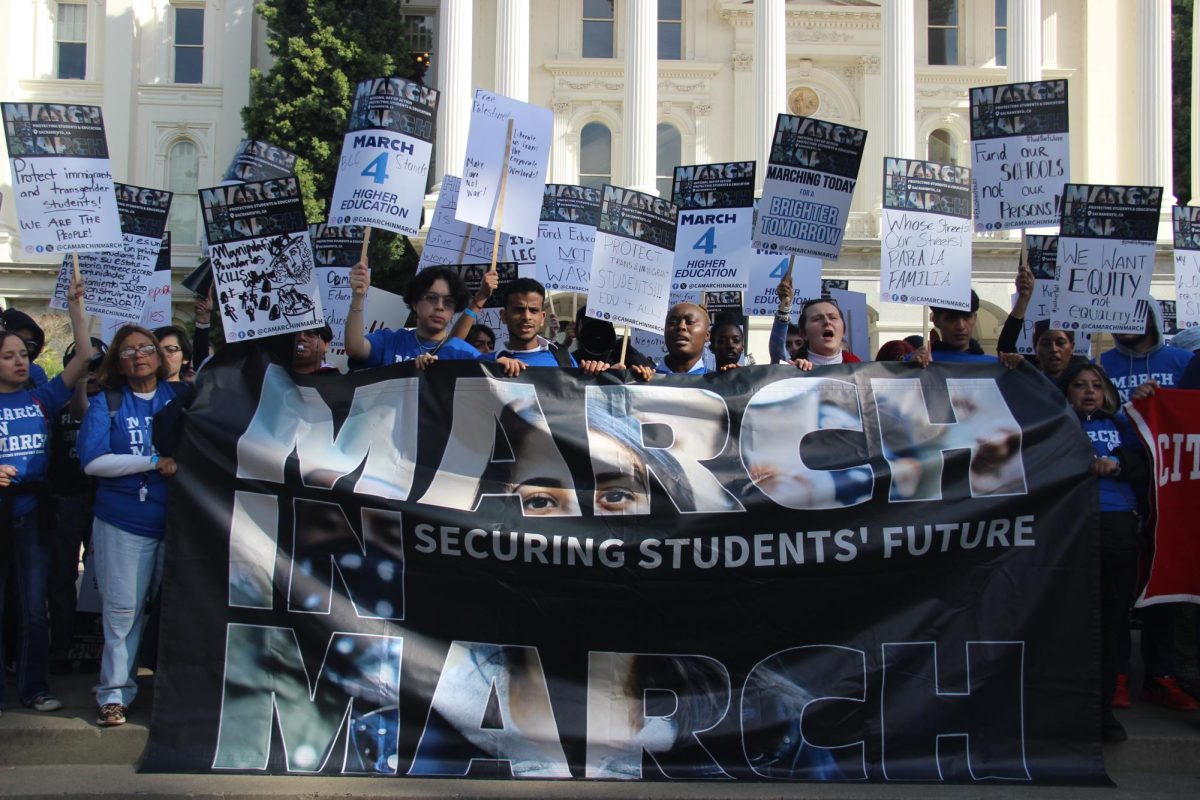Hundreds of students, educators and community members marched in support of higher education and in protest of recent government budget cuts on education in downtown Sacramento on Tuesday.
The march started in Southside Park at 2 p.m., where protesters in blue shirts that said ‘March in March’ traveled down the streets of downtown and eventually ended at the Capitol West Lawn on 10th St. At the Capitol, marchers were met with speakers and more supporters chanting, “The people united will never be defeated!”
Wendy Brill-Wynkoop, the president of the Faculty Association of California Community Colleges and event speaker, said while growing up, her mother graduated from the University of California, Los Angeles at almost no cost. She said her mother’s education propelled her to become a doctor and changed their family’s social mobility.
“This is what’s at stake today, the promise that public education can create new beginnings and brighter futures for entire families,” Brill-Wynkoop said. “The promise belongs to all of us. At community colleges, we don’t just serve the top 10%, or the top 50% of students, we open our doors to the top 100% seeking knowledge.”
The California Community Colleges are the backbone of educational opportunities in the state, Brill-Wynkoop said.
There are 116 community colleges in California with over 2 million students enrolled, according to the California Community Colleges website.
“Yet today, our mission faces unprecedented threats, the current administration’s agenda is proposing cuts in education, plans to dismantle the department of education and attacks on vulnerable students threatens everything we stand for,” Brill-Wynkoop said.
Brill-Wynkoop said educators and students are seeing targeted attacks on diversity initiatives, assaults on fundamental rights for LGBTQ+ students and new waves of unknown possibilities for immigrants from proposed legislation.
Cross Timbol, a 20-year-old communications major from Los Angeles Pierce Community College, said he is a target for the administration’s current legislation because he is a person of color and identifies as transgender.
“At least I know that what’s happening in politics isn’t right, right now,” Timbol said.
The attacks aren’t just on education, but democracy itself, Brill-Wynkoop said.
“Society without broad access to higher education becomes a citizenry disengaged in the political process,” Brill-Wynkoop said.
Education develops critical thinking skills and expands the understanding of why participating in civic engagement is important, Brill-Wynkoop said.
“It is about creating an informed electorate that can protect our democratic institution,” Brill-Wynkoop said. “Education is a public good, critical to the health of our democracy.”
Chelena Fisher, a 40-year-old academic counselor from Cerritos College, in Norwalk, said it’s the people’s right to protest for their future and for those who couldn’t attend.
“I love that we have all of these groups of people coming together with just the same motive,” Fisher said. “That we’re all united for the same type of vision and dream. That’s ultimately what higher education is all about.”
Nancy Cullpepper, the event organizer and media from the 50501 Sacramento chapter, said it will be more impactful to see younger people support their community at events like hearings at the Capitol protests, marches and local gatherings.
The 50501 Sacramento Movement organizes peaceful protests promoting inclusivity, non-violence and conflict resolution, according to their website.
“The revolution stops for nobody and right now I think it’s up to everybody to speak up and if you’re not speaking up, you’re currently a part of the problem,” Cullpepper said.
There needs to be better education and support for children and educators to make America better, Cullpepper said.
“Without education, we’re not growing and without education, we’re not building our youth,” Culpepper said. “By not providing that for our youth, we are denying their future.”
Cullpepper said she saw many people join from off the street, many who asked about more details regarding how they could help in the future.
“Yes we can protest, but protesting is not just what we need to stop it,” Cullpepper said. “We can start by protesting to be able to fight for what we believe in.”
The next step is to organize with the community to uplift local community members, and to fight for policies and representatives that promote a better future for education, immigration, women’s rights and LGBTQ+ rights, Cullpepper said.
“Silence historically gets you nowhere and I’m not going to be a part of that,” Cullpepper said. “Everyone who’s here today making their voices loud and heard is just as powerful as any organizer, any community organization, any political group.”

